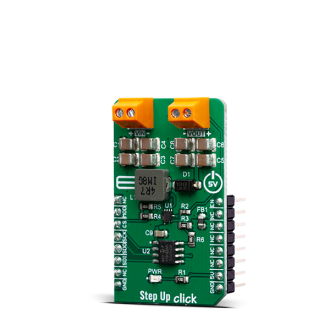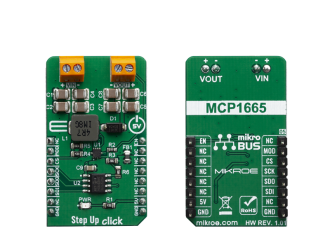
We strongly encourage users to use Package manager for sharing their code on Libstock website, because it boosts your efficiency and leaves the end user with no room for error. [more info]

Rating:
Author: MIKROE
Last Updated: 2019-08-15
Package Version: 1.0.0.0
mikroSDK Library: 1.0.0.0
Category: Boost
Downloaded: 3618 times
Not followed.
License: MIT license
Step Up Click is a fixed frequency DC-DC step-up (boost) regulator, which can be obtained from any low voltage input - such as NiCd, NiMH or one cell Li-Po/Li-Ion batteries.
Do you want to subscribe in order to receive notifications regarding "Step Up click" changes.
Do you want to unsubscribe in order to stop receiving notifications regarding "Step Up click" changes.
Do you want to report abuse regarding "Step Up click".


Library Description
Library contains functions for setting states of RST and PWM pins Library contains function for setting configuratoin word Library contains function for setting output value Library contains function for calculating output value expressed in percent Library contains function for device initialization.
Key functions:
uint8_t stepup_setConfig( uint16_t config ) - sets first 4 bits in command word.uint8_t stepup_setOut( uint16_t out_value ) - sets output value.void stepup_init(void) - initializes the device.Examples description
The application is composed of three sections :
void applicationTask( )
{
if (UART_Data_Ready( ) == 1)
{
uart_char = UART_Read( );
switch ( uart_char )
{
case '-' :
{
if (out_value < 4095)
{
out_value++;
}
stepup_setOut( out_value );
stepup_logPercent( out_value );
break;
}
case '+' :
{
if (out_value > 0)
{
out_value--;
}
stepup_setOut( out_value );
stepup_logPercent( out_value );
break;
}
default :
{
mikrobus_logWrite( "error : invalid command", _LOG_LINE );
break;
}
}
}
}
Additional Functions :
Other mikroE Libraries used in the example:
Additional notes and informations
Depending on the development board you are using, you may need USB UART click, USB UART 2 click or RS232 click to connect to your PC, for development systems with no UART to USB interface available on the board. The terminal available in all MikroElektronika compilers, or any other terminal application of your choice, can be used to read the message.